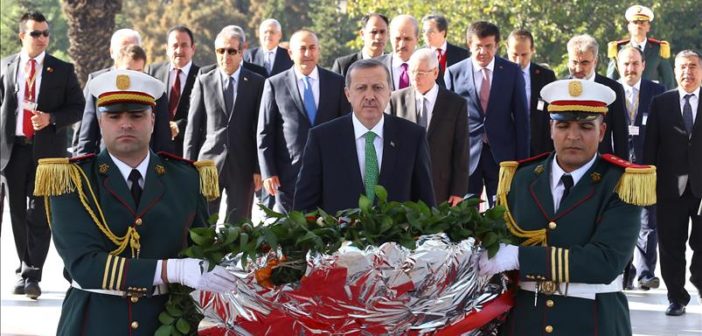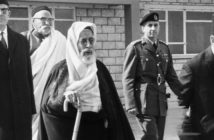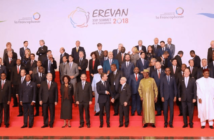On 26 February 2018, the Turkish president Recep Tayyip Erdoğan paid an official visit to Algeria, the first country he chose to be the beginning of his African tour included also Mali, Mauritania and Senegal. This visit followed Erdogan’s last African tour that took place from December 24 to 27, 2017 leading him to Sudan, Chad and Tunisia. Despite the political agenda of this visit described by the Algerian presidency as very important and the meetings between Erdogan and his Algerian counterpart Abdelaziz Bouteflika as well as the other senior responsibles, the economic agenda seemed to be the central aim of the visit. Algerian and Turkish officials signed then seven agreements of partnership in the sectors of energy, tourism, culture, agriculture, and diplomacy amounted to 2.3 billion $, ending this visit by inaugurating the Ketchaoua Mosque after being restored by the Turkish Cooperation and Coordination Agency TİKA, the Heritage which represents an historical symbol of 5 centuries of Turkish-Algerian friendship.
Erdogan’s visit raised concern to France’s interests in Algeria
Some Algerian political and Media figures attributed to the Francophone trend expressed their alarm over the Turkish superiority in the field of investments. It is clearly evident that Turkey over the past years topped the list of foreign investors in Algeria as it was announced by Algerian sources in 2017, especially since Erdogan had showed in his previous visit at the end of 2014 Turkey’s desire to raise the volume of investments in Algeria to the level of 10 billion dollars, through the concentration of nearly a thousand Turkish companies for commercial and investment activities. The given which explains the high level of the French media crowd in Algeria against Erdogan’s visit. Paris sees with suspicion and concern the Turkish expansion in Africa, the continent that has been considered by France as “Espace vital” and a strategic sphere of influence as Paris still keeps stronger economic and politico-military relations with the regimes of its former colonies in framework of what has been known as Françafrique. France has been also increasingly concerned about the possibility of success of the Turkish economic and political expansion in the Maghreb region due to common historical and religious factors combining Turkey with the region. In addition to the existence of political forces active within these states that have welcomed the economic presence of Turkish companies in order to benefit from the successful experience of the economic transformation in Turkey since the AK Party (The Justice and Development Party) came to power in 2002. One to add is the Turkish investment approach, which seems more pragmatic and based on the principle of win-win policy. The approach which has been rational and acceptable compared to the approach of France with its former colonies that has often been described as a policy of dominance.
During this visit, the Turkish president stated that “Algeria is an island of political and economic stability in its region” offering his country’s readiness to help Algeria overcome its economic and financial crisis caused by the reduction of oil prices. He said: “We are also aware of the economic challenges facing Algeria because of the low energy prices; we are ready to provide the necessary support to overcome this problem. At the same time, we must avoid steps that would hinder business growth between our two countries”. The Turkish president pointed out that Turkey is ready to provide many goods to Algeria, at a lower cost and a high quality, rather than the expensive cost of the same goods coming from the European Union. From the Algerian part, the Algerian Prime Minister Ahmed Ouyahia stressed that Turkey is a strategic partner and an important contributor to the creation of jobs in the country.
There is no doubt that since the Friendship and Cooperation Agreement was signed during the visit of Erdoğan as a Turkish Prime Minister to Algeria in 2006, the level of trade between the two countries has known a turning point reaching the threshold of 5 billion dollars. The volume of investments of Turkey in Algeria has currently exceeded $ 3.5 billion, and there is a desire from the two parties to increase the number of volume trade to 10 billion dollars in the next years. This is reflected through the largest Turkish investment complex in Africa for textile industries located in the city of Gilizan. This project is expected to provide 25 thousand jobs at a cost of completion reached 1.5 billion$. In addition to the project that opened in 2013 by the Turkish steel company Tosyali, when it launched in the city of Oran an iron and steel plant, with an investment of $750 million. In a press statement, Tosyali’s operators announced that their investments in Algeria’s iron and steel sector amounted to $ 2.250 billion in 2017 and would raise these investments to $ 6 billion in 2021, after the completion of two new iron and steel plants worth about $ 4 billion.
In response to the critics of some political and Media figures upon the visit of the Turkish President claiming that Turkey played a negative role during the Arab spring, particularly in Libya and Syria, one of the strongest statements had made by the head of the parliamentary bloc of Mouvement de la Société pour la Paix, Nasser Hamdadouche, when he affirmed the fact that Algeria is Turkey’s largest partner in Africa, and this does not need any ideological, historical or religious interpretation. The pragmatic economic need of both countries requires this partnership especially that Algeria needs to experience success outside the hydrocarbon sector. He added that the Turkish investments in Algeria are up to 3.5 billion dollars, with the presence of nearly 800 Turkish companies and enterprises with an employment volume of more than 28,000 Algerian workers, while French companies that exceed 2000 companies, and represent 20% of foreign companies in Algeria, employee just about 4000 workers, referring to a French lobby who tries to tackle the Turkish investments. Nasser Hamdadouche claimed also that The size of the privileges exemptions and extraordinary dealings of Algeria with France directly or under the cover of partnership with the European Union is hardly comparable to the size of the obstacles facing the Arab and Islamic countries wishing to invest in Algeria because of the sensitivity of some countries towards Algerian-Turkish relations referring to the historical and ideological backgrounds of the French lobby in Algeria.
Why is strengthening the bilateral relationships very important for the two sides?
The recent visit of the Turkish President to Algeria, under the regional circumstances witnessed by the region, demonstrated the common will of the two sides to strengthen their partnership and coordinate efforts to face those challenges in a collective manner and for the mutual benefit of all, since regional political and security issues need to combine efforts to reach consensus in order to find solutions to the thorny issues of the region. So, this part of the article addresses the gains and opportunities that can both Algiers and Ankara benefit from strengthening the bilateral relationships.
In the Economic Sector
The Economic opportunities that can benefit Ankara and Algiers from each other represent a strong motivation for strengthening their bilateral economic relations. For Turkey, Algeria is a promising foreign market, especially since Ankara lost many of its trade relations in the region after the outbreak of the Arab spring in 2011, specifically with Libya, which for Turkey was an important economic market in the region with trade exports of nearly $ 10 billions. Algeria has thus become the best option for Turks in North Africa because of the stability of this country and the investment opportunities that the Algerian market would offer to the Turkish investors. In addition, the security situation of the neighboring countries of Turkey, Syria and Iraq, has forced the Turkish government to move to promising new markets outside the Middle East to compensate the trade losses suffered by Turkey’s foreign trade during the past years. Therefore, the current circumstances force Ankara to seek to strengthen its economic relations with new African partners including Algeria.
On the Algerian side, Turkey will be an important economic partner, and a new alternative for getting the products that Algeria needs in order to reduce the economic dependence on the European countries. Algeria would be also able to benefit greatly from the experiences of Turkey in improving its economic performance outside the hydrocarbon sector. Algeria is practically not ready to establish a free exchange area as Turks demand because of the conditions related to the quality of the Algerian economy, which still suffers from dependence on the hydrocarbons sector. For this reason, identifying and promoting partnerships in specific economic sectors is the best way for building a balanced and win-win partnership for all. In addition, the establishment of a partnership in specific area like textile industries, steel, energy and construction sectors would greatly benefit the Algerian companies working in these fields in order to obtain the necessary experiences and expertise to promote the private sector in Algeria. Especially that the Turkish experience in those sectors is a pioneer and the Turkish companies compete today in the strongest international markets, and this of course will contribute to the promotion of economic partnership between the two countries. Because achieving success in a particular economic sector, will lead to the spread of experience on the other sectors according to the spill over principle as proposed by the Neo-functionalist theory in international relations.
In the Energy sector
In the energy sector, Turkey represents a promoting external market from which Algeria can benefit in order to raise its exports in the energy field in the future, especially that Turkey is considered as a country that lacks energy resources. Reports pointed out that Turkey provides its energy needs from its local sources by only ¼ while importing three quarters of other countries with a bill estimated at 60 billion dollars annually, where Russian energy sources account for 1/3 of the quantities of energy imported. The rising Turkish economy can also benefit greatly from Algeria’s energy resources such as gas, oil and other natural resources, especially as the energy security of Turkey is linked to the neighboring countries of the east, representing the most important natural gas exporting countries to Turkey. In its energy strategy, Ankara seeks to reduce its dependence on the Russian and Iranian gas by diversifying its sources of imports since Ankara imports 55% of its natural gas needs from Russia, 16% from Iran and 13% from Azerbaijan. In this context, Algeria would be the best option for Turkey to obtain energy and diversify the sources of imports to avoid any future pressure in this field. Among the crisis that emerged in the field of energy in Turkey, there was the Turkish-Russian crisis in 2015, after Turkey’s shooting down of a Russian war plane violated Turkish airspace, followed by the emergence of expectations that Moscow would cut off natural gas from Turkey, which imports 55% of it from Russia under The economic sanctions imposed by Moscow at that time, The crisis made Ankara seriously seeking for alternative gas exporting countries in order to reduce independence on the Russian gas. Algeria, the tenth largest country in terms of gas reserves, would be then an important energy option for Turkey to reduce its reliance on the neighboring countries in the field of energy.
In the Geo-strategic Side
From a geo-strategic point of view, strengthening Turkish-Algerian relations will have a great positive impact on Turkey’s opening up to Africa; the policy that has been followed by the AK Party since Ankara declared 2005 as the year of Africa. The geopolitical position of Algeria as the largest African country and its long-standing borders on the Mediterranean sea as well as common borders with 6 African countries are of great strategic importance to Turkey helping it to strengthen its partnership with many African states which can be reached through Algeria.
In addition, Algeria retain a great credibility among the countries of the African continent, given its long history of standing with the African countries by supporting their independence against the colonial power as well as promoting the just causes of the continent. Therefore, Turkey is aware of the importance of linking friendly and cooperative relations with the influential African players like Algeria. Therefore, this would ensure in the future the avoidance of a clash of interest between Ankara and the other influential African countries.
On the other hand, Algeria can benefit from strengthening its partnership with Turkey a lot especially in the context of its foreign policy, which has been seeking to diversify the regional and international partners, in accordance with the assumption which claim that increasing the regional and international partners will increase the margin of maneuver in a state foreign policy, the approach adopted by Algerian diplomacy since the end of the cold war. This policy has led to openness and building partnerships in many fields and with many regional and international forces such as Spain, Italy, the United States, China and Germany, and the policy of opening up to Turkey comes within the same framework.
Conclusion
The last visit of the Turkish president to Algeria showed that the opportunities for building a strategic partnership between both countries remain largely in view of the common interests. In spite of the geographical distance and the different visions on some regional issues which the leaders of the two states seek to overcome, many factors of convergence are available, especially that Turkey-Algeria relations retain a long historical heritage within the framework of the Ottoman empire with a strong friendship shaping the relations between the two countries’ people for long decades. Moreover, the good economic opportunities which can Ankara and Algiers provide to each other represent another strong motivation for leading the two countries towards building a strategic partnership in several aspects. The partnership that would positively reflect on the national interests of the two countries.




